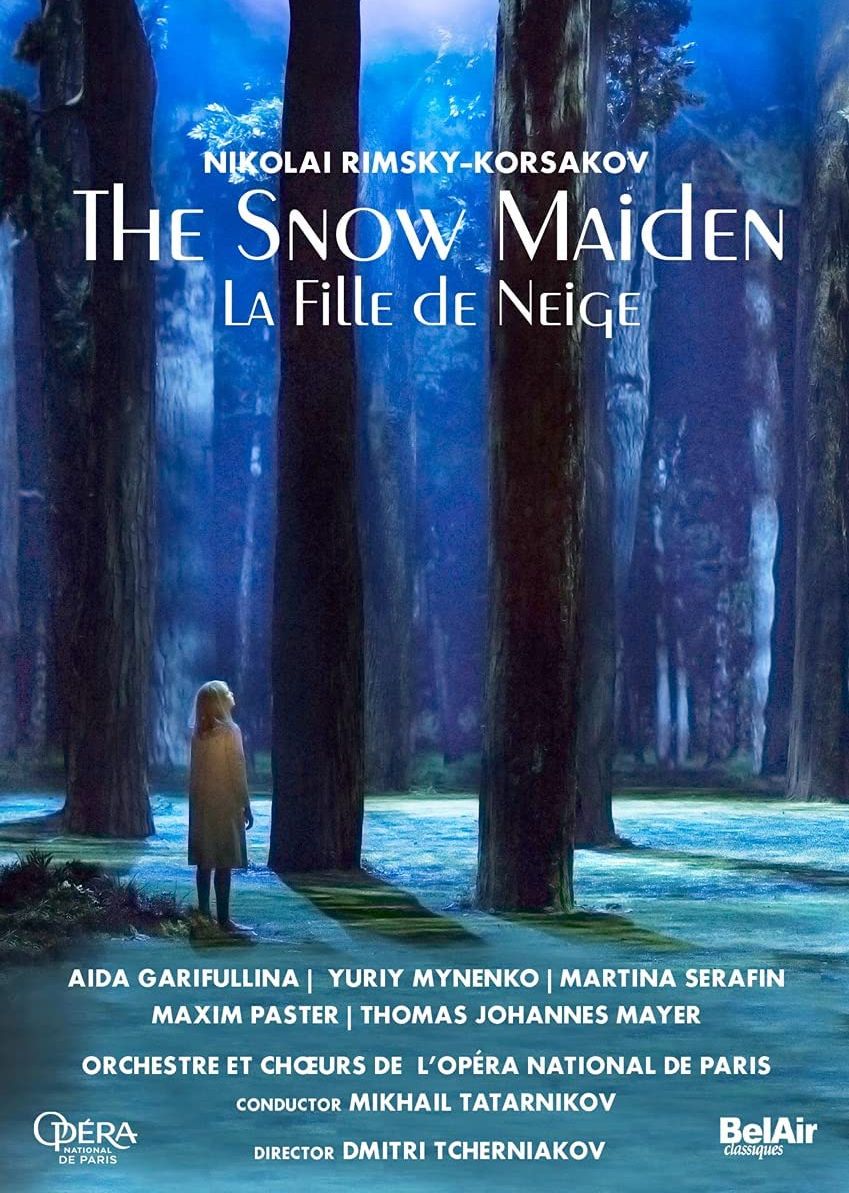RIMSKY-KORSAKOV The Snow Maiden (Tatarnikov)
View record and artist detailsRecord and Artist Details
Genre:
Opera
Label: Bel Air Classiques
Magazine Review Date: 08/2021
Media Format: Digital Versatile Disc
Media Runtime: 194
Mastering:
DDD
Catalogue Number: BAC186

Tracks:
| Composition | Artist Credit |
|---|---|
| Snow Maiden (second version) |
Nikolay Rimsky-Korsakov, Composer
Aida Garifullina, Snow Maiden, Soprano Elena Manistina, Spring Beauty, Mezzo soprano Franz Hawlata, Bermyata, Bass-baritone Martina Serafin, Kupava, Soprano Maxim Paster, Tsar Berendy, Tenor Mikhail Tatarnikov, Conductor Paris National Opera Chorus Paris National Opera Orchestra Thomas Johannes Mayer, Mizguir, Baritone Vasily Gorshkov, Bobïl-Bakula, Tenor Vladimir Ognovenko, Father Frost, Bass Yuriy Mynenko, Lel, Countertenor |
Author: Marina Frolova-Walker
I would never pass up the chance to see a Dmitri Tcherniakov production. Highly controversial he may be, but his innovations follow a thoroughly musical logic and his theatrical shocks enable us to hear familiar scores as if they were freshly composed. The Snow Maiden at the Paris Opéra is no exception, and it is a showcase for his art.
The Snow Maiden could be called well known or obscure, according to the perspective. It is a hardy perennial in Russia but has never taken root abroad. Even Russians seldom hear the original score – productions there are condensed versions. With over three hours of music and a story that unfolds at a very leisurely pace, it is little wonder that substantial cuts are the norm. On a first examination of the DVD’s packaging, we might suppose that there is a misprint: after 45 minutes we only reach the beginning of Act 1. But there is no mistake. This is The Snow Maiden exactly as Rimsky-Korsakov wrote it.
The opera was composed in 1881 and is set in a fairy-tale past. Tcherniakov relocates it in today’s Russia. Father Frost and Spring Beauty are the estranged parents of our 15-year-old heroine, and neither has any time for her (although Frost, ironically, is warmer towards her than the self-centred mother). They place her in the hands of free-love hippies living in a mobile-home community. This updating of the original’s Kingdom of Berendey is a real stroke of genius: it gives us a new key to the drama and makes sense of it on a deeper level. Over the course of this 45-minute Prologue, we begin to appreciate the brilliance of the casting: Vladimir Ognovenko, the veteran Mariinsky bass, is a fascinating character actor, while Elena Manistina as Spring is a suitably over-the-top full-blooded mezzo. The Snow Maiden waits in silence; but when finally she opens her mouth, she commands all our attention, for this is Aida Garifullina with striking good looks and committed acting. But on top of this is a honeyed voice and a beautiful sense of line that fully absorbs all her breathtaking high notes. Tcherniakov could not have found a better Snow Maiden.
Act 1 contains another of Tcherniakov’s strokes of genius: Lel, the god of love, is normally a contralto trouser role but here he is a sex-god countertenor (Yuriy Mynenko), in love with his own hair. Having seen so many unconvincing female Lels in my time, I rejoiced at this casting. Mynenko has an arresting voice, exceptionally clear and even, and for the first time I was able to delight in Lel’s self-indulgent songs. Maxim Paster is an equally inspired choice for Tsar Berendey, reinterpreted as the half-benign, half-sinister leader of the hippy cult.
The modernisation works remarkably well, revealing (or creating) new aspects of this seemingly innocuous fairy tale. The story was traditionally about coming of age and seasonal change, but now it is transformed into a dark and violent tale of abuse. The jubilant hippies, milling on the stage in a deliberately under-choreographed manner, salute their leader and reject the newcomer. We are in Wicker Man territory, even if the hippies here stop short of the film cult’s psychopathy.
This is all very well, but can Rimsky-Korsakov’s music support such a radical reinterpretation of the story? Admittedly, there is one character who is sacrificed in Tcherniakov’s reading, namely Mizgir (Thomas Johannes Mayer), who is reduced to a caricature of toxic masculinity. To be fair, even traditional productions found Mizgir an awkward fit, and Tcherniakov decided to adjust the plot slightly (which I won’t give away), so that his music (and the Snow Maiden’s music for him) is given a paradoxical twist. But aside from this, the score is simply made to work harder, with the welcome result that it doesn’t lapse into the usual tweeness. The orchestra and choir of the Paris Opéra rise admirably to the challenge (under music director Philippe Jordan and conductor Mikhail Tatarnikov). This faded Rimsky-Korsakov gem regains all its sparkle here: it has been researched, staged, sung and filmed with true love and commitment.
Discover the world's largest classical music catalogue with Presto Music.

Gramophone Digital Club
- Digital Edition
- Digital Archive
- Reviews Database
- Full website access
From £8.75 / month
Subscribe
Gramophone Full Club
- Print Edition
- Digital Edition
- Digital Archive
- Reviews Database
- Full website access
From £11.00 / month
Subscribe
If you are a library, university or other organisation that would be interested in an institutional subscription to Gramophone please click here for further information.




